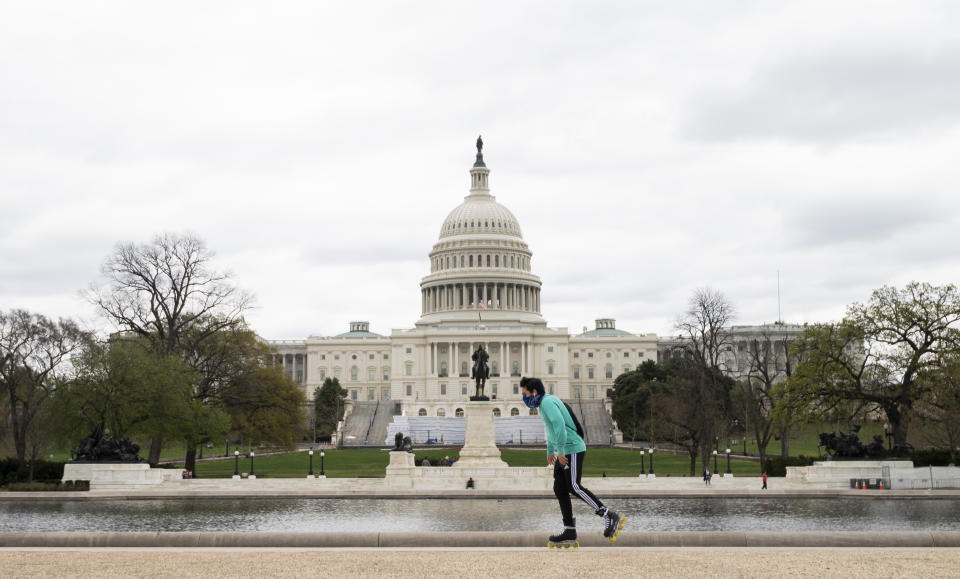Bill to delist ‘deceitful’ Chinese companies could go further: investor
Last week, the Senate unanimously passed a bill to take on Chinese companies listed on U.S. stock exchanges. The legislation would require them to submit to multiple provisions if they wish to remain listed.
At least 156 Chinese companies are currently on the big three U.S. stock exchanges, including giants like Alibaba (BABA), Baidu (BIDU) and JD.com (JD).
Rep. Brad Sherman (D-CA) immediately introduced the bill in the House. Speaker Nancy Pelosi has promised to review it saying she’s “asked my committees to take a look at what it is.”
Sherman, in a statement to Yahoo Finance, noted that Luckin Coffee’s possible delisting for accounting fraud was a “painful reminder” of the vulnerability for investors. “I am working closely with Chairwoman Maxine Waters and Speaker Pelosi on moving the Holding Foreign Companies Accountable Act forward in the House and am hopeful that it will soon be considered on the floor,” he said.

The bill focuses on “deceitful Chinese companies” and was authored by Senators John Kennedy (R-LA) and Chris Van Hollen (D-MD). It was first introduced in 2019 well before the coronavirus pandemic. The issue has taken on new urgency this year as Washington searches for any way to punish China for its handling of the early stages of the pandemic and its recent actions to crack down in Hong Kong.
The White House is even reportedly considering sanctions on Chinese officials and businesses over their Hong Kong actions. National Economic Council Director Larry Kudlow told Fox News that President Trump is “miffed” at China. Kudlow also offered support for the delisting bill, saying that Chinese companies “are full of fraud” and “if they come to our exchange, they must comply with normal accounting standards.”

A ‘very kid gloves’ approach
Carson Block, founder of Muddy Waters Research and renowned short seller, suggested the bill could go even further. “I think it's actually really funny that China is pushing back on this,” Block told Yahoo Finance’s On the Move. “The bill that passed the Senate last week is actually – it's a very kid gloves bill in terms of how China is treated here.” Block has been called “a scourge of listed Chinese companies” and the “Most Hated Man In China” after exposing (and shorting) companies like Orient Paper.
The bill gives Chinese companies three years to get into compliance with the Public Company Accounting Oversight Board. The PCAOB maintains a list of companies – both in China and around the world – that are not in compliance.
Sherman says that over 240 Chinese companies are currently listed and lack appropriate oversight.
Block tweeted approvingly about the bill and said “a large large percentage of companies from China listed in America are committing at least some level of fraud and that's because they can get away with it.” The fraud continues, Block says, because “literally, not one [Chinese] national who chaired one of these companies has ever been materially punished.”
In this interview I explain why Holding Foreign Companies Accountable Act is very fair to PRC government (no mention of Art 177). cc: @POTUS @marcorubio @SenJohnKennedy @ChrisVanHollen @BradSherman @SpeakerPelosi @SenTomCotton @SenKevinCramer @SenRickScott @SenatorMenendez https://t.co/pNmb4LX9Aj
— MuddyWatersResearch (@muddywatersre) May 26, 2020
A Hill aide familiar with the legislation added that the “bill would be the first policy that has teeth, that has real consequences for foreign companies” that refuse to comply.
‘The tragedy of this whole thing’
“The important thing here is that much of the retail capital would not follow” Chinese companies to foreign exchanges, Block said. Currently, a lot of these Chinese companies “are dominated by retail money right now, and that’s the tragedy of this whole thing.”
However things work out on Capitol Hill, Block says many of these Chinese companies are beginning to look at their options. “I think the Chinese companies will look at Hong Kong as a backup,” he said, “because the situation in the U.S. is becoming unstable for them.”
Ben Werschkul is a producer for Yahoo Finance in Washington, DC.
Read more:
Senate moves to delist Chinese companies from US stock exchanges
Why Trump is moving closer to punishing China for the coronavirus
US sanctions to slow down deployment of 5G technology: Huawei exec
Read the latest financial and business news from Yahoo Finance
Follow Yahoo Finance on Twitter, Facebook, Instagram, Flipboard, LinkedIn, YouTube, and reddit.
